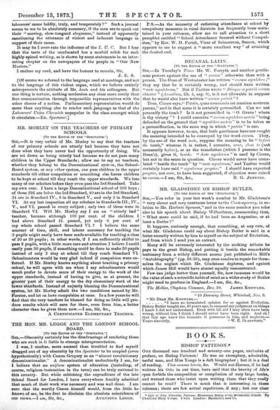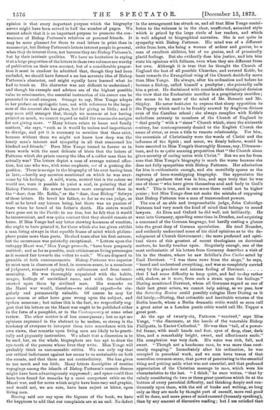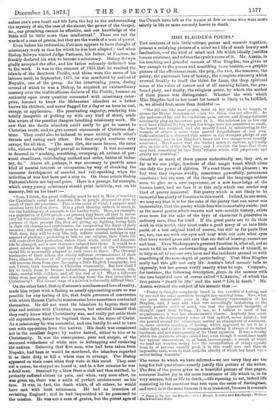BOOKS.
BISHOP PATTESON.*
ONE thousand one hundred and seventy-one pages, exclusive of preface, on Bishop Patteson I He was an exemplary, admirable, useful man, and Miss Yonge is a deft biographer ; but it is a deal of reading. Vitae summa brevis, &c. Would not Horace, if he had written his Odes in our time, have said that the brevity of life's span forbids the composition or compilation of very large books, and warned those who insist upon writing them that they really cannot be read ? There is much that is interesting in theft volumes; there are few actual repetitions, if any ; but our clear
Life of John Coleridge Paifflon, Missionary Bishop of Use Melanesian Islands. By
Charlotte Mary Tongs. 2 vole. London: Macmillan and Co.
opinion is that every important purpose which the biography serves might have been served in half the number of pages. We cannot admit that it is an important purpose to promote the con- venience of Bishop Patteson's relatives or personal friends. It may be more pleasant for these to read letters in print than in manuscript, but Bishop Patteson's letters interest people in general, when they do interest them, not because they are Bishop Patteson's, but by their intrinsic qualities. We have no hesitation in saying that a large proportion of the letters in these two volumes are worthy of publication on their own account, but of a considerable propor- tion it mug in candour be admitted that, though they had been excluded, we should have formed a no less accurate idea of Bishop Patteson's character, and might equally have learned what he had to teach us. His character was not difficult to understand ; and though his example and advices are of the highest possible value to missionaries, the essential instruction of his career can be presented in small compass. Strange to say, Miss Yonge adopts in her preface an apologetic tone, not with reference to the large- ness of the amount she has given, but for giving so little ; and it may seem still stranger that, though we murmur at her having printed so much, we cannot regard as valid the reasons she assigns for not giving more. "Many letters relate to home and family matters," she says, "such as it would be useless and impertinent to divulge, and yet it is necessary to mention that these exist, because without them we might not know how deep was the lonely man's interest and sympathy in all that concerned his kindred and friends." Does Miss Yonge intend to favour us in these words with the most delicate of hints that the letters of Patteson which she prints convey the idea of a colder man than he actually was? The letters depict a man of average natural affec- tion, but one who was, with some emphasis, not of a gushing dis- position. There is no sign in the biography of his ever having been in love,—hardly any occasion mentioned on which he was over- come by his feelings. A mild, warm, neutral tint is the colour we would use, were it possible to paint a soul, in painting that of Bishop Patteson. He never becomes more enraptured than in the "dear, dear Mr. Keble," or the "dear, dear Bishop" Selwyn of these letters. He loved his father, so far as we can judge, as well as he loved any human being, but there was no passionNof tears when he heard of his father's death. His sisters would have gone out to the Pacific to see him, but he felt that it would be inconvenient, and was quite content that they should remain at home. If Miss Yonge had any letter showing keenness of emotion, she ought to have printed it, for those which she has given exhibit a man living always in that equable frame of mind which philoso- phers praise more than poets. He shed tears after his first sermon, but the occurrence was pointedly exceptional. "Letters upon the unhappy Maori war," Miss Yonge proceeds, "have been purposely omitted ; and as far as possible, such criticisms on living personages as it seemed fair towards the writer to omit." We are disposed to grumble at both announcements. Bishop Patteson was superior to most men in clearness of head, in common-sense, in a soundness of judgment, removed equally from callousness and from senti- mentality. He was thoroughly acquainted with the habits, usages, feelings of uncivilised races, and with the influence exerted upon them by civilised men. His remarks on the Maori war would, therefore—we should expect—be sin- gularly and permanently valuable. Of course he may for some reason or other have gone wrong upon the subject, and spoken nonsense ; but unless this is the fact, we respectfully sug- gest that his letters on the Maori war ought to be published either in the form of a pamphlet, or in the Contemporary or some other review. The other matter is of less consequence ; but so apt are opinions expressed in the abstract to be useless, so strong is the tendency of everyone to interpret them into accordance with his own views, that remarks upon living men are likely to be practi- cally and piquantly instructive. We admit that a discretion is to be used, but, on the whole, biographers are too apt to draw the eye-teeth of the persons whose lives they write. Miss Yonge will probably think us unreasonable critics. We can only say that our critical indictment against her seems to us sustainable on both the counts, and that these are not contradictory. She has given us too much and too little. Many letters descriptive of routine voyagings among the islands of Bishop Patteson's oceanic diocese might have been advantageously suppressed ; and space could thus have been found for remarks by a most competent critic on the Maori war, and for notes which might have been racy and graphic, and would not, we are sure, have been unjust or bitter, upon living men.
Having said our say upon the bigness of the book, we have the happiness to add that our complaints are at an end. No defect in the arrangement has struck us, and all that Miss Yonge contri- butes to the volumes is in the clear, unaffected, animated style which is prized by the large circle of her readers, and whicit is well adapted to biographical narrative. She is not quite in sympathy with Bishop Patteson. His mind was of a different order from hers, she being a woman of ardour and genius, he a; man of excellent abilities, but of no genius, and of prosaically placid feelings. But she evidently does him justice, and lets him state his opinions with fullness, even when they are different from her own. Although it is true that he thought the Church of England the best of all possible Churches, and revered Keble, he leant towards the Evangelical wing of the Church decidedly more than Mies Yonge. He always, after his ordination and before he became a Bishop, called himself a presbyter ; she pointedly calla him a priest. He disclaimed with considerable theological deciaiorr the view that the Eucharistic sacrifice is a propitiatory sacrifice ; she seems to be more of the mind of Mr. Bennett and Mr. Shipley. He never hesitates to express that sharp opposition to the Papacy which used to be frankly avowed by Anglican divinew even of the Caroline school ; she always complies with Keble's melodious entreaty to members of the Church of- England tcr "deal gently" with a " sister " Church which, since the sixteenth, century, has contemptuously denied to the English Church the name of sister, or even a title to remote relationship. For him„ the essentials of Christianity were the words of Christ and the influence of the Spirit ; and never, we firmly believe, would he have assented to Miss Yonge's thoroughly Roman, nay, Ultramon- tans, and to us quite amazing proposition that " the Church alone gives security of saving union with Christ." But we are far from sure that Miss Yonge's biography is much the worse because she does not fully sympathise with Bishop Patteson. Her admiration for him is enthusiastic enough, and she mercifully spares us the- raptures of hero-worshipping biography. She appreciates the- thorough goodness that was in him, and says truly that he was one of those" who have given themselves soul and body to God's work." This is true, and in one sense there could not be higher- praise ; but Miss Yonge does not make the mistake of supposing- that Bishop Patteson was a man of transcendent powers.
The son of an able and irreproachable judge, John Coleridge Patteson had very much the kind of mind that belongs to sound lawyers. At Eton and Oxford he did well, not brilliantly. He went into Germany, spending some time in Dresden, and acquiring a command of the German language, but hardly casting a glance. into the great deep of German speculation. He read Neander, and evidently understood some of his chief opinions as to the de- velopment of Church Government ; the more profound and spiri- tual views of this greatest of recent theologians on doctrinal matters, he hardly touches upon. Singularly enough, one of the most enthusiastic of his letters from Germany describes a visit of his to the theatre, where he saw Schiller's Don Carlos acted by- Emil Devrient. "I was three rows from the stage," he says, "heard and understood everything, and was so completely carried away by the grandeur and intense feeling of Devrient that I had some difficulty to keep quiet, and feel to-day rather odd, shaken, as it were, from such a strain upon the feelings." Having mentioned Devrient, whom all Germans regard as one of their last great actors, we cannot help asking, as we pass, how- the Saturday Review could possibly eulogise Herr airing as it did lately,—Doring, that estimable and inevitable veteran of the boards, whom a Berlin dramatic critic would as soon call a great actor as a London poetic critic would call Mr. Tupper a great poet.
At the age of twenty-six, Patteson "received," says Miss Yonge, "the diaconate, at the hands of the venerable Bishop Phillpotts, in Exeter Cathedral." He was then "tall, of a power- ful frame, with small hands and feet, eyes of deep, clear, dark blue, and a remarkably bright, sweet, and affectionate smile." His complexion was very dark. His voice was rich, full, and sweet. "Though not a handsome man, he was more than cord- monly engaging." Immediately after his ordination, he was occupied in parochial work, and we soon have traces of that masculine common-sense, that power of penetrating to the essential thing and putting aside what was not essential, and that profound appreciation of the Christian message to man, which were his characteristics to the last. "I think," he once writes, "that by calmly considering the two or three great questions which lie at the bottom of every parochial difficulty, and thinking deeply and con- tinuously upon them, with the aid of books and writing, so long only as they are made by thought part of oneself, more real good will be done, and more peace of mind ensured (humanly speaking), than by any amount of discursive reading ; but I am satisfied that
unless one's own heart and life form the key to the understanding the mystery of sin, the case of the sinner, the power of the Gospel, &c., our preaching cannot be effective, and our knowledge of the Bible will be little more than intellectual." These are not the words of a man of genius, but they are the words of a man of power.
Even before his ordination, Patteson appears to have thought of missionary work as that for which he was best adapted ; and when Bishop Selwyn visited Judge Patteson, his father, at Feniton, he frankly declared his wish to become a missionary. Bishop Selwyn gladly accepted the offer, and his father solemnly dedicated him to the work. It was in the summer of 1855 that he reached the islands of the Southern Pacific, and these were the scene of his labours until, in September, 1871, he was murdered by natives of Nupaku, one of the group. In the intervening years, during several of which he was a Bishop, he acquired an extraordinary mastery over the multitudinous dialects of the Pacific, became an authority upon every question connected with missionary enter- prise, learned to know the Melanesian islanders as a father knows his children, and never flagged for a day or an hour in zeal, energy, or application. His penetrating sagacity, rendering him totally incapable of putting up with any kind of sham, made him aware of the peculiar dangers besetting missionary work. He saw that the docile islanders could easily be got to assent to Christian truth, and to give correct statements of Christian doc- trine. They could also be induced to cease cutting each other's throats and eating each other. But they might continue very savage, for all that. "The same dirt, the same houses, the same idle, vicious habits" might prevail as formerly. It was necessary to descend to "washing, scrubbing, sweeping, all actions of per- sonal cleanliness, introducing method and order, habits of indus- try, &c." Above all, perhaps, it was necessary to provide some kind of mental interest or occupation, by way of checking the immense development of scandal and evil-speaking when the activities of war had been put a stop to. On these points Bishop Patteson's hints are beyond price. Here is a passage, for example, which every young missionary should print indelibly, not on his memory, but on his heart :—
"Soon, I think, the great difficulty must be met in Mote of teaching the Christian's social and domestic life to people disposed to give up much of their old practices. This is the point at which I suppose most missions have broken down. It is a great blessing, indeed, to reach it, but the building-up of converts is the harder work. Hero, for example, is a population of 1,500 people ; at present they know all that is neces- sary for the cultivation of yams, &c., they build houses sufficient for the purpose of their present life, they are giving up fighting, losing faith in their old charms and contrivances for compassing the death of their enemies ; they will very likely soon be at peace throughout the island, Well, then, they will bo very idle, talk infinite scandal, indulge in any amount of gluttony ; professing to believe our religion, their whole life will contradict that profession, unless their whole social and domestic life be changed, and a new character infused into them. It would be a great mistake to suppose that the English aspect of the Christian's social life is necessarily adapted to such races as these. The Oriental tendencies of their minds, the wholly different circumstances of thoir lives, climate, absence of all poverty or dependence upon others, &c., will prevent them from over becoming a little English community, but not, I trust, their becoming a Christian community. But how shall I try to teach them to become industrious, persevering, honest, tidy, clean, careful with children, and all the rest of it ? What a different thing from just going about and teaching them the first principles of Christianity ! The second stage of a mission is the really difficult time."
On the other hand, Bish op Patterson's manliness and love of reality, made him reject with a feeling as nearly approaching scorn as was possible for any feeling of his, that facile pretence of conversion with which Roman Catholic missionaries have sometimes contented themselves. He did not want the islanders to baptise their old rites and notions with Christian names, but satisfied himself that they really knew what Christianity was, and really put aside their old superstitions before he baptised them in the name of Christ. As a missionary Its was successful, and can hardly be said to have met with opposition from the natives. His death was occasioned not in the smallest degree by native hatred, either to him or to Christianity. It was the consequence, pure and simple, of the -accursed wickedness of white men in kidnapping and enslaving the natives. Believing that five men, who had been taken from Nupaku, had been or would be murdered, the islanders regarded it as their duty to kill a white man in revenge. The Bishop appeared on their coast when they were in this mood. They sent out a canoe, he stepped on board it, and in a few minutes he was a dead man. Stunned by a blow from a club and then stabbed, he probably suffered almost no pain, and when, very soon after, he was given up, there was a smile of perfect contentment on his face. It was, in fact, the death which, of all others, he would have met with least reluctance. He had no intention of revisiting England ; and he had bequeathed all he possessed to the mission. He was not a man of genius, but the purest ages of
the Church have left us the names of few or none who were more saintly in life or more serenely heroic in death.












































 Previous page
Previous page